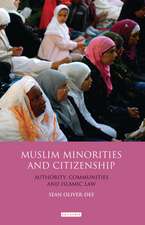Dissent and Revolution in a Digital Age: Social Media, Blogging and Activism in Egypt
Autor David Farisen Limba Engleză Paperback – 25 mai 2015
Dissent and Revolution in a Digital Age tracks the rocky path taken by Egyptian bloggers operating in Mubarak's authoritarian regime to illustrate how the state monopoly on information was eroded, making space for dissent and digital activism.
| Toate formatele și edițiile | Preț | Express |
|---|---|---|
| Paperback (1) | 217.09 lei 3-5 săpt. | |
| Bloomsbury Publishing – 25 mai 2015 | 217.09 lei 3-5 săpt. | |
| Hardback (1) | 772.98 lei 6-8 săpt. | |
| I. B. Tauris & Company – 29 mar 2013 | 772.98 lei 6-8 săpt. |
Preț: 217.09 lei
Preț vechi: 244.45 lei
-11% Nou
Puncte Express: 326
Preț estimativ în valută:
41.54€ • 45.11$ • 34.90£
41.54€ • 45.11$ • 34.90£
Carte disponibilă
Livrare economică 01-15 aprilie
Preluare comenzi: 021 569.72.76
Specificații
ISBN-13: 9781784532079
ISBN-10: 178453207X
Pagini: 288
Dimensiuni: 138 x 216 x 25 mm
Greutate: 0.32 kg
Editura: Bloomsbury Publishing
Colecția I.B.Tauris
Locul publicării:London, United Kingdom
ISBN-10: 178453207X
Pagini: 288
Dimensiuni: 138 x 216 x 25 mm
Greutate: 0.32 kg
Editura: Bloomsbury Publishing
Colecția I.B.Tauris
Locul publicării:London, United Kingdom
Notă biografică
David
Faris
is
Assistant
Professor
of
Political
Science
at
Roosevelt
University,
where
he
teaches
Egyptian
and
Middle
Eastern
Politics.
He
holds
a
PhD
in
Political
Science
from
Pennsylvania
University.
Cuprins
Chapter
1:
Social
Media
and
Authoritarian
Politics
in
EgyptChapter
2:
A
Theory
of
the
Networked
Revolt:
Social
Media
Networks,
Media
Events
and
Collective
ActionChapter
3:
Agenda-Setters:
Torture,
Rights
and
Social
Media
Networks
in
EgyptChapter
4:
New
Tools,
Old
Rules:
Social
Media
Networks
and
Collective
Action
in
EgyptChapter
5:
(Amplified)
Voices
for
the
Voiceless:
Social
Media
Networks,
Minorities,
and
Virtual
Counter-Publics
Chapter
6:
We
Are
All
Revolutionaries
Now:
Social
Media
Networks
and
the
Egyptian
Revolution
of
2011Chapter
7:
Cascades,
Colors,
and
Contingencies:
Social
Media
Networks
and
Authoritarianism
in
Global
Perspective
Recenzii
Understanding the role of digital media in the evolution of the Arab Spring is a monumental task, and talking about 'Twitter Revolutions' or 'Facebook Uprisings' is a nonstarter. David Faris makes compelling arguments precisely because his analysis is not tied to a particular tool or application. With a focused study of Egypt, he is able to demonstrate the strong connection between social media diffusion and civic mobilisation. Yet through his comparative study of other recent digital uprisings, he is able to demonstrate a weak connection to the success of those revolutionaries who get inspired by digital cascades of information'. Philip N. Howard, Fellow of Princeton University and the author of The Digital Origins of Dictatorship and Democracy: Information Technology and Political Islam. (2010) 'David Faris has written a thoughtful, broadly comparative and theoretically informed analysis of social media in Egyptian politics over the last decade. With a wide range of rich examples, he shows how and where the new media environment mattered as well as where its impact has been exaggerated. A welcome contribution to the growing comparative literature on the political effects of the internet in the Arab world and beyond.' Marc Lynch, Associate Professor of Political Science at George Washington University and author of The Arab Uprisings: The Unfinished Revolutions of the New Middle East (2012). 'A powerful new contribution to the growing body of knowledge on social networks and political change, Dissent and Revolution in a Digital Age is an important resource for scholars, policymakers and activists seeking to understand the circumstances under which digital tools aid mobilisation and collective action in authoritarian contexts.' Shanthi Kalathil, co-author of Open Networks, Closed Regimes: The Impact of the Internet on Authoritarian Rule (2003).












